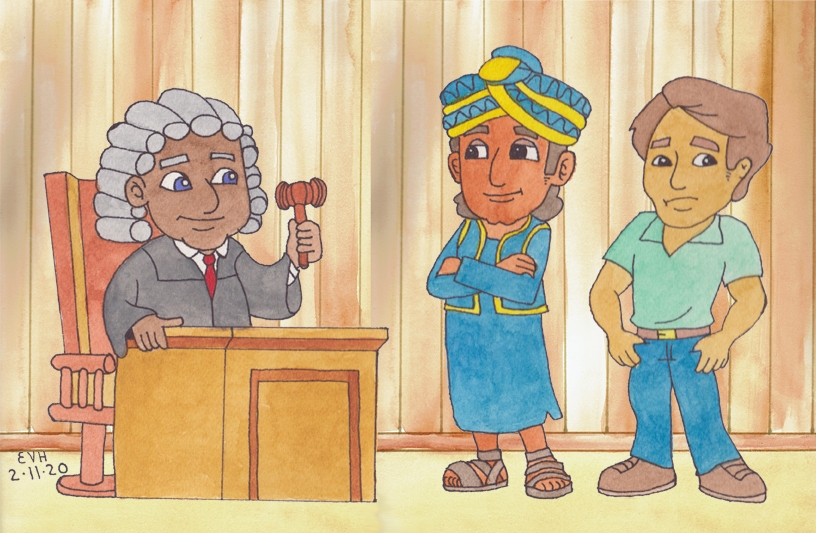
Jataka 218
Kuṭa Vāṇija Jātaka
The Dishonest Trader
as told by Eric Van Horn
originally translated by William Henry Denham Rouse, Cambridge University
originally edited by Professor Edward Byles Cowell, Cambridge University
This is a clever little story in which an honest merchant not only sniffs out the dishonesty of his partner, but finds a way to expose him in court.
“Well planned indeed!” The Master told this story he was while staying at Jetavana. It is about a dishonest trader.
There were two traders from Sāvatthi. One was virtuous and the other was a cheat. These two joined in a partnership. They loaded 500 wagons full of merchandise and traveled from east to west for trade. They returned to Sāvatthi with a large profit.
The pious trader suggested to his partner that they should divide their stock. The rogue thought to himself, “This fellow has been roughing it for so long with bad food and lodging. Now that he is home again, he’ll eat all sorts of delicacies and die of gluttony. Then I will have all the stock for myself.”
So he responded by saying, “Neither the stars nor the day are favorable. Tomorrow or the next day we’ll take care of it.” So he kept putting it off.
However, the pious trader pressed him and the division was made. Then he went to see the Master with scents and garlands. And after a respectful salutation, he sat on one side. The Master asked when he had returned. “Just two weeks ago, sir,” he said. “Then why have you taken so long to visit the Buddha?” The trader explained. Then the Master said, “It is not only now that your partner is a scoundrel. He was just the same before.” And at his request he told him this story from the past.
Once upon a time, when Brahmadatta was the King of Benares, the Bodhisatta came into this world as the son of a member of the King’s court. When he grew up he was made the Lord Justice.
At that time, two traders, one from a village and one from the town, were friends together. The villager gave 500 plowshares (plow blades) to the townsman. The townsman sold these and kept the money, and in the place where they had been he scattered mouse dung. By and by the villager came by, and asked for his ploughshares.
“The mice have eaten them up!” said the cheat, and pointed out the mouse dung to him.
“Well, well, so be it,” replied the villager. “What can be done with things that mice have eaten?” (In ancient India anything eaten by mice or rates was considered unlucky.)
Now at bathing time the villager took the other trader’s son and sent him to a friend’s house. He put him in an inner chamber and told him not to go outside. And after washing himself he went to his friend’s house.
“Where is my son?” asked the cheat.
“Dear friend,” he replied, “I took him with me and left him on the river bank. And when I went down into the water, a hawk came down. He seized your son in his extended claws and flew up into the air. I beat on the water, shouted, and struggled, but I could not make him let go.”
“Lies!” cried the rogue. “No hawk can carry off a boy!”
“Let it be, dear friend. If things happen that should not, how can I help it? Your son has been carried off by a hawk, I say.”
The other reviled him. “Ah, you scoundrel! You murderer! Now I will go to the judge and have you dragged before him!” The villager said, “As you please.” And then the scoundrel left and went to the court of justice. He addressed the Bodhisatta, saying, “My lord, this fellow took my son with him to bathe, and when I asked where he was, he answered that a hawk had carried him off. Judge my cause!”
“Tell the truth,” the Bodhisatta said, asking the villager.
“Indeed, my lord,” he answered, “I took him with me, and a hawk carried him off.”
“But where in the world are there hawks that can carry off boys?”
“My lord,” he answered, “I have a question to ask you. If hawks cannot carry off boys into the air, can mice eat iron ploughshares?”
“What do you mean by that?” the Bodhisatta asked.
“My lord, I left 500 ploughshares in this man’s house. The man told me that the mice had eaten them, and he showed me the droppings of the mice that had done it. My lord, if mice can eat ploughshares, then hawks can carry off boys. But if mice cannot do this, then neither can hawks carry the boy. This man says the mice ate my ploughshares. Give sentence whether they have eaten them or not. Judge my cause!”
“He must have meant,” the Bodhisatta thought, “to fight the trickster with his own weapons. Well devised!” he exclaimed, and then he uttered these two verses:
“Well planned indeed! The biter bit,
The trickster tricked - a pretty hit!
If mice eat ploughshares, hawks can fly
With boys away into the sky!
“A rogue out-rogued with tit for tat!
Give back the plough, and after that
Perhaps the man who lost the plough
May give your son back to you now!”

Figure: “Well Devised!”
Thus the townsman who had lost his son received him again, and the villager received the money from the sale of his ploughshares that he had lost. And afterwards both passed away to fare according to their karma.
When this discourse ended, the Master identified the birth: “The cheat in both cases was the same, and so was the clever man. I was the Lord Chief Justice.”
